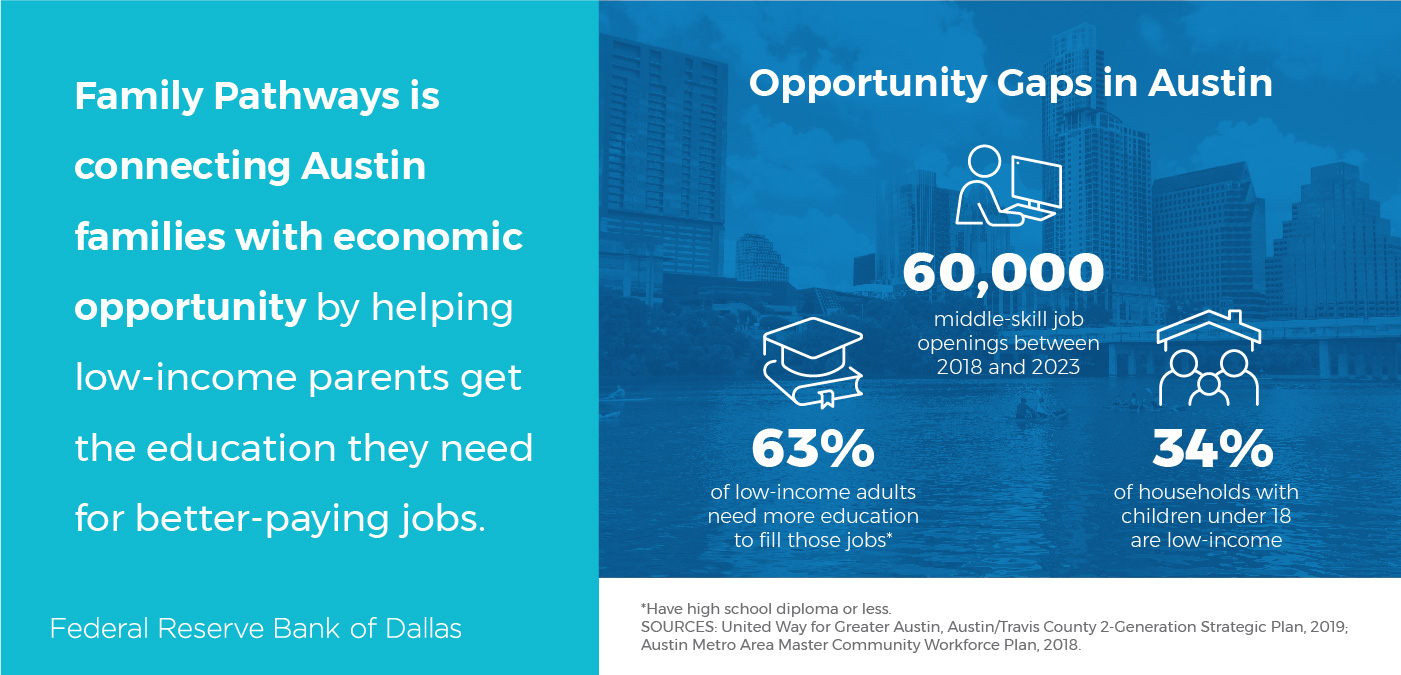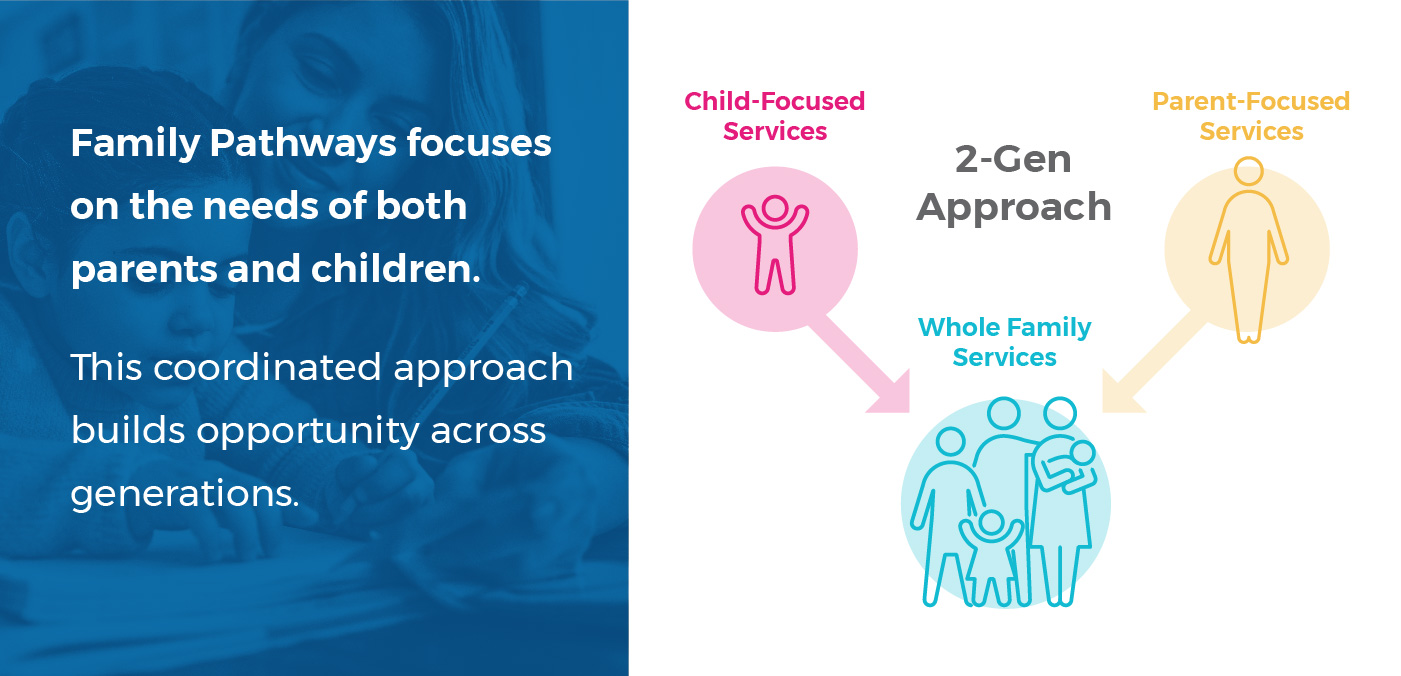
Austin partnership supports parenting students to build opportunity across generations
Esmeralda Chavez struggled with being a parent of two, college student and worker in Austin before she joined a new local program providing wraparound services for young parents. Through the program, Chavez received financial support to help cover basic needs, including rent and groceries. The support enabled her to continue pursuing her associate’s degree while the program empowered her as a parent-leader in the community.
“Being a participant has opened doors for several opportunities,” Chavez said. “It has given me more knowledge on how things work in the community and helped me become a better person.”
The program that made a difference for Chavez—and her children—is an initiative of Austin’s Family Pathways 2-Gen Coalition. Led by United Way for Greater Austin, the coalition is a partnership of local organizations working across sectors to improve postsecondary success for parents like Chavez. It aims to create a path toward sustainable employment and economic stability for low-income families in the Austin area.
As a participant in the Dallas Fed’s Advance Together initiative, Family Pathways is preparing to accelerate its work to improve education and workforce outcomes in the region.
Connecting parents with middle-skill jobs to promote economic mobility
Family Pathways focuses its efforts on meeting the needs of both parents and children to spur economic mobility for Austin families. It provides a full range of support services and incentives to help postsecondary students who are parenting children to stay in school and complete programs that prepare them for high-demand careers that pay a family-sustaining wage.
Many of these careers are middle-skill jobs, those that require more education than a high school diploma but less than a four-year college degree. The Austin metro is experiencing a robust demand for middle-skill positions, presenting economic opportunities for lower-income workers to find higher-earning jobs. In 2018, the Austin Metro Area Master Community Workforce Plan estimated that over the next five years, the Austin area would have more than 60,000 middle-skill job openings. More than half of these jobs are in the healthcare, information technology and skilled trades sectors.
Despite the availability of these jobs and the economic opportunity they represent, many low-income parents in Austin are not qualified to apply. As reported in the coalition’s strategic plan, the majority (63 percent) of low-income adults in the Austin area have an education level of high school diploma or less, meaning they do not have the skills and credentials to get middle-skill jobs. Moreover, 34 percent of area households with children younger than 18 years old are low-income. This indicates the potential scope of impact on two generations when low-income parents get the support they need to further their education.

Positioning parents for success: comprehensive services and financial incentives
To address Austin’s middle-skills gap, Family Pathways is working with a pilot cohort of 60 Austin Community College (ACC) parenting students enrolled in high-demand degree programs. It provides students like Chavez with wraparound services and support, including living stipends, child care, advising, tutoring and textbook assistance, as well as financial incentives for completing a certain number of credits. The pilot is the first guaranteed-income program for parenting students in the country.
Helping participants financially is a critical component of the program. “We know that 85 percent of parents at Austin Community College are only enrolled part time because they have at least two jobs,” said Paola Silvestre Porras, director of Family Pathways. “Providing a stipend can help them to quit one of their part-time jobs, enable them to take an extra class, be less stressed, having a positive ripple effect on their children.”
Participating parents are also equipped with information on how their career advancements and income increases may impact their eligibility for public assistance programs—what is known as the “benefits cliff.” Coaches help them use the Career Ladder Identifier and Financial Forecaster (CLIFF) Dashboard to anticipate and plan to offset the potential loss of public assistance as they pursue their career.
Innovating on the 2-gen model: community-wide support
The Family Pathways strategy, implemented in 2019, was the first community-wide two-generation (2-Gen) plan in the nation, encompassing more than 100 Austin-area organizations that directly provide services for program participants. The 2-Gen approach targets low-income families by addressing the needs of both children and parents to disrupt the intergenerational cycle of poverty. This multipronged approach comprises education, social capital and financial stability interventions for each generation.

“A lot of individual places implement 2-Gen models, but there is not a community-wide strategic plan like ours. We are trying to build an ecosystem by bringing in various organizations, including housing and postsecondary organizations,” Silvestre Porras said. “Although we started our 2-Gen coalition in 2019 and we are still building out our infrastructure, we know that the 2-Gen model works and is evidence-based.”
The approach takes into consideration that the educational attainment of parents is an indicator of child outcomes. Having parents complete their education generally leads to higher-paying jobs for them and thus to more resources for their children to succeed.
Engaging parents’ perspectives: A program that “works for families”
Family Pathways has a strong community engagement component, involving the input of the parenting students it serves. Parents are at the forefront of decision-making on the program’s design and services and are compensated for providing their input.
“Parents are sitting at the tables where decisions are being made about them, so it's true human-centered design to build that social services ecosystem that really works for families,” Silvestre Porras said.
For Chavez, serving as a member of the parent committee led to a career opportunity. United Way for Greater Austin saw great potential in her and hired her as a coordinator to further support the Family Pathways work and advocate for student parents.
“I instantly became in love with the work. The more connected I was, the more I was invested to learn, and when the opportunity came up to become the coordinator, I took it,” Chavez said.
Collaborative effort shows early wins for student parents
As an Advance Together grantee, Family Pathways is receiving $300,000 from philanthropic sources to further its plans to address education and workforce challenges in the community, as well as training and coaching from the Dallas Fed to increase the impact of its programs.
Coalition leaders see the flexible funding support as instrumental. While the Family Pathways financial incentive program is still in the pilot stage, it has seen some early wins. Preliminary data indicate that, compared with other student parents at ACC, participants in the pilot cohort have seen increases in average retention rate, GPA and number of courses completed.
Reflecting on her interactions with parenting students like herself, Chavez said, “The program is helpful because having extra income that comes in for attending school is helpful for parents to cover a book or something that their kids need, and they find it really helpful because they’re able to share what they’re experiencing and are compensated for it.”
Family Pathways seeks to further develop and increase its supports for students to demonstrate that providing financial assistance and other services can lead to increases in postsecondary retention and completion rates. To accomplish this, coalition leaders look to continued collaboration with partner organizations to provide direct services and funding to students, investments from the City of Austin and Travis County, and centering parenting student voices to build social services ecosystems that work for them.
“At the end of the day, the program is so families can benefit, and this is about our community doing better. The narrative of prosperity that we hear about Austin is not true for all the people who live here, and there are a lot of people who live in poverty,” Silvestre Porras said. “If we want to alleviate poverty, we need to affect systems.”The Dallas Fed leads Advance Together in partnership with Educate Texas, United Ways of Texas and a steering committee of business, education and community leaders. It coordinates the program but does not fundraise, provide grants or participate in the selection of grantees. Funding partners include the Doris Duke Charitable Foundation, the Kresge Foundation, Texas Mutual, Communities Foundation of Texas and the Meadows Foundation.
Author
The views expressed are those of the author and should not be attributed to the Federal Reserve Bank of Dallas or the Federal Reserve System.